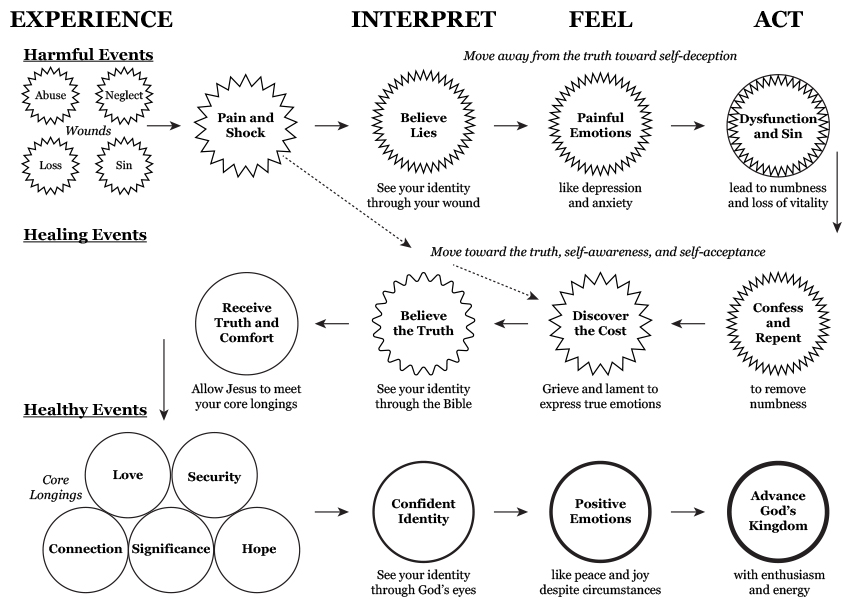Are you feeling drained of all hope? Whether it’s a dramatic upheaval or subtle, persistent struggles, the effects can be deeply discouraging. Some traumas are obvious because they are intense–these are called “Big T” traumas. Other traumas are subtle because they are weak but repetitive–these are called “Little T” traumas. Both kinds can produce lasting disabilities, even though they manifest differently.
#1 The Pain of Losing a Parent or Child
Losing a parent or child is one of life’s most challenging moments. When the loss is premature, whether through miscarriage or death of a young child, it can feel particularly tragic. The dreams, hopes, and plans once anchored around loved ones vanish, leaving an indescribable void. Such disorientation can lead to profound questions, like whether life is still worth living. It is heartbreaking to invest so much emotionally in others, only to find them suddenly and completely absent.
#2 The Scars of Betrayal
Betrayal cuts deep across personal and professional realms. Whether it’s a partner who breaks trust, a friend who abandons you, or a coworker who exploits vulnerabilities, the impact lingers. Betrayal creates emotional scars, shaking confidence and leaving individuals hesitant to trust others again. Repeated betrayals magnify trauma and can drain the hope of finding reliable connections.
The worst kind of betrayal results in shock from the sudden exposure of a completely different reality, such as finding out your spouse is cheating on you. However, betrayal can also happen on a micro scale, like when your spouse uses your vulnerabilities against you in an argument. Sometimes, betrayal stems not from active harm but from the absence of good, such as friends abandoning you without any explanation.
#3 Struggles with Financial Hardship
Navigating financial hardship can be exhausting. Searching tirelessly for employment amidst constant rejections or losing a job despite loyalty and hard work can erode self-esteem. Financial insecurity often causes stress and anxiety, affecting relationships and mental health. The seemingly endless cycle of hope and despair can feel suffocating, draining one’s ability to envision a brighter future.
#4 The Impact of Bullying and Isolation
Bullying and isolation leave individuals feeling misunderstood and undervalued. In school, children may face ridicule for their uniqueness–be it external like body image or clothing, or internal, like processing thoughts or emotions differently than others (now popularly referred to as neurodivergence). For example, a child with ADHD may process thoughts differently, which can make them a target for misunderstanding and exclusion.
In toxic workplaces, adults may encounter criticism or be ignored altogether. The persistent feeling of invisibility and lack of appreciation can drain hope, making it hard to believe that a better environment is possible.
#5 Challenges of Abusive or Neglectful Parents
Parents play a pivotal role in shaping a child’s outlook. Abusive or neglectful parents often blur healthy boundaries, leaving children to fend for themselves emotionally or physically. Abuse can involve excess control, while neglect stems from a failure to provide what is needed to thrive. Some parents are preoccupied with other activities or simply incompetent.
Parentification, where children take on parental roles, robs them of innocence and creates enduring struggles with self-worth and relationships. For example, a nine-year-old shouldn’t be cooking dinner for the family every night. Nor should she be responsible for managing her parents’ emotions.
#6 Struggles with Health Issues
Facing chronic illness or surviving near-death experiences can shatter one’s sense of stability and control. Health issues can make daily life feel like a battle, draining energy and hope for recovery. The psychological toll of adjusting to a “new normal” can feel like an uphill climb, with each step weighed down by doubt and exhaustion.
#7 The Pain of Divorce
Divorce signifies the breakdown of a once-promised lifelong bond. Feelings of rejection and failure intensify when the separation is complicated by sabotage or unfair claims. Divorce can leave emotional scars that affect trust, self-worth, and the hope of finding enduring love.
#8 Trauma from Violent Crime
The aftermath of violent crime, such as rape, assault, or vandalism, often includes emotional trauma that is hard to reconcile. Victims may feel a loss of safety and confidence. The violation of one’s dignity and security can lead to despair and fear that recovery is unattainable.
#9 Devastation from Natural Disasters
Natural disasters strike unexpectedly, disrupting homes and lives. Tornados, hurricanes, mold outbreaks, and infestations can leave families struggling to rebuild their sense of safety. The emotional strain of starting over after such devastation can make hope feel distant, especially when faced with recurring challenges.
Experiences that drain hope are often tied to trauma, but recognizing these moments is the first step toward healing. Feeling drained is likely a normal response given the intensity of your experiences. While trauma may cast shadows over joy and stability, understanding its roots allows for growth and recovery. God’s care and encouragement, even amidst life’s trials, can nurture the flame of hope, guiding individuals to reclaim their lives.
If you need help managing these draining experiences, Matt is available to provide support while illuminating the path to recovery. Here is another post about biblical hope.
Image by AMOREMPOESIAS from Pixabay
























